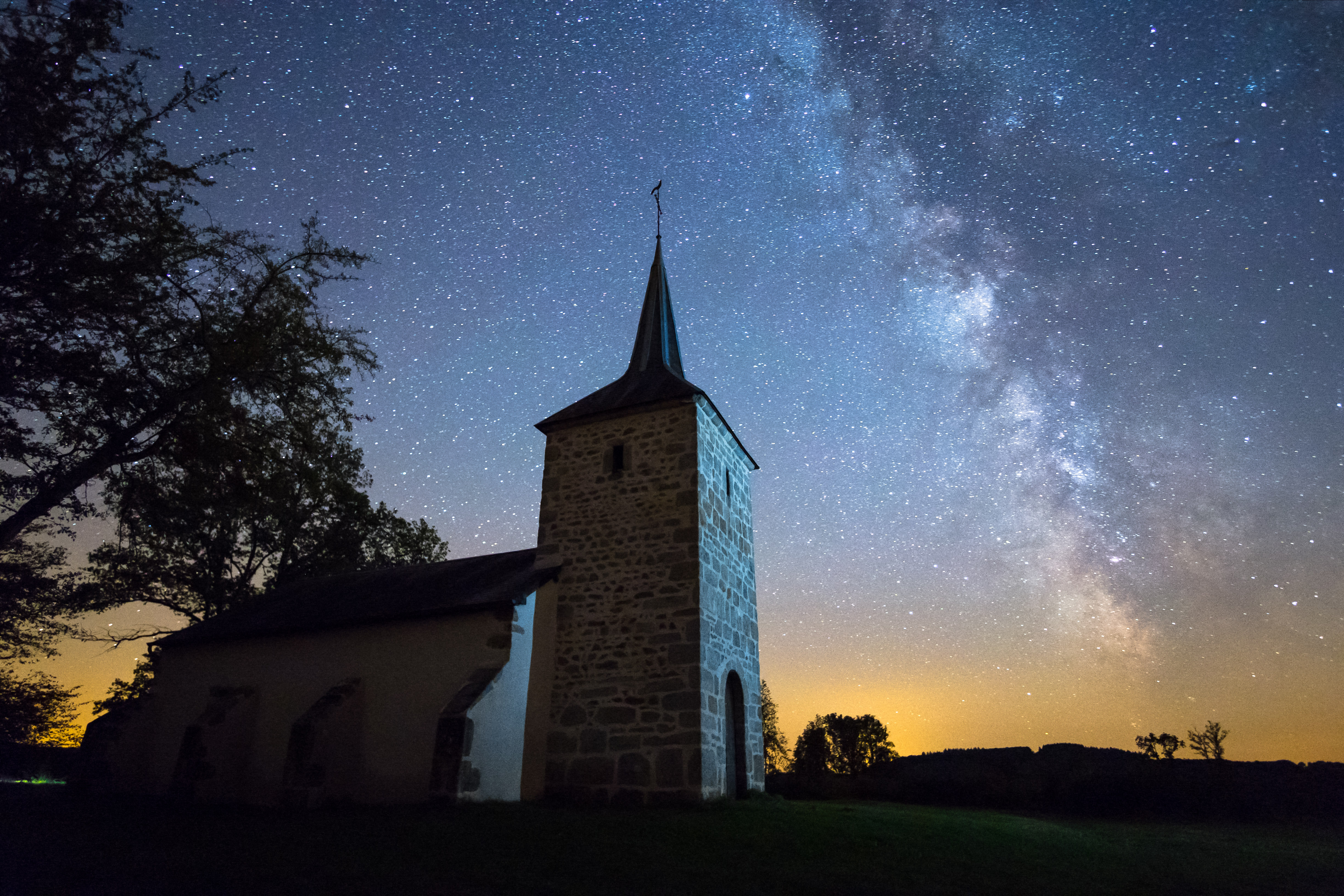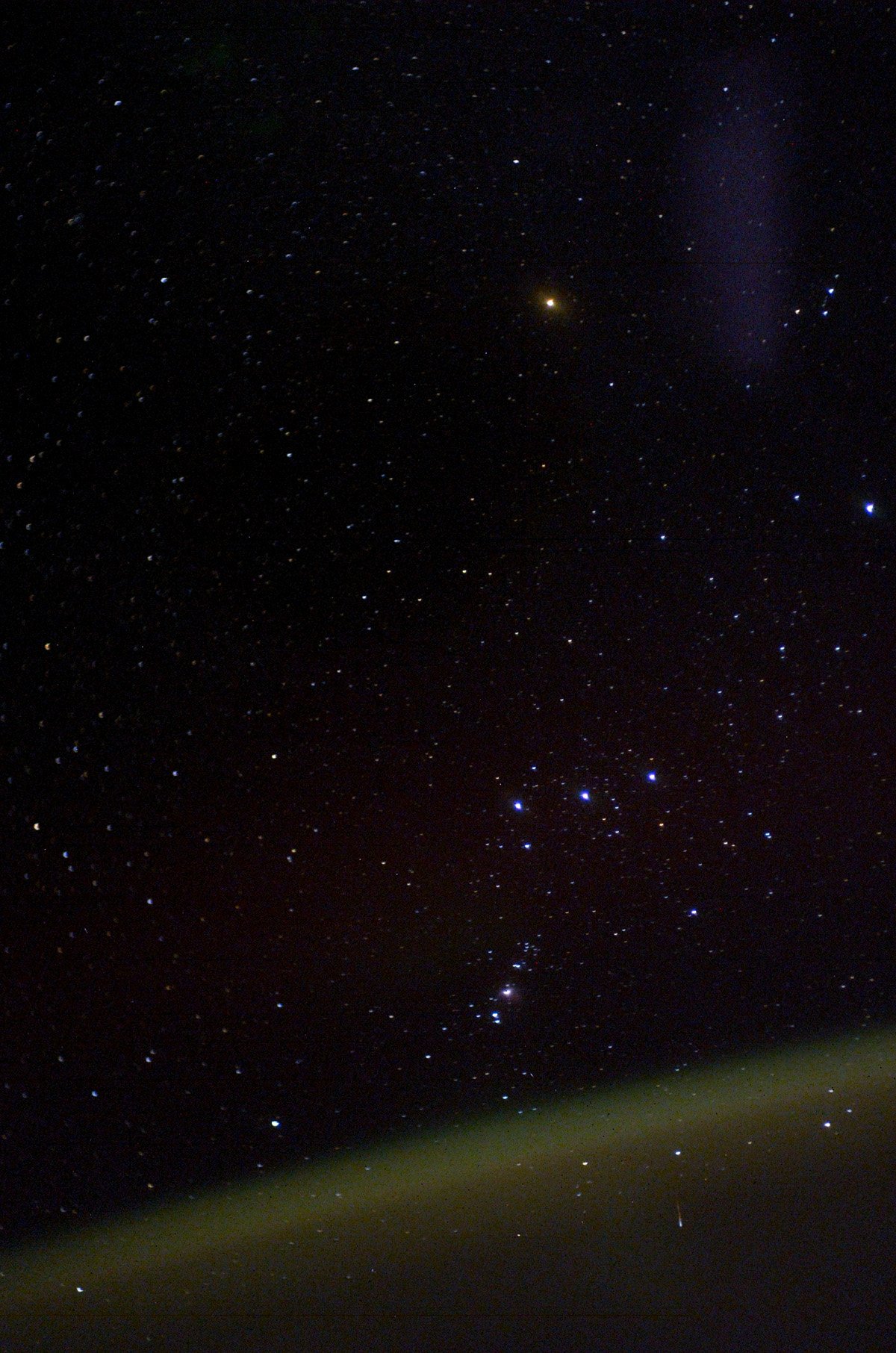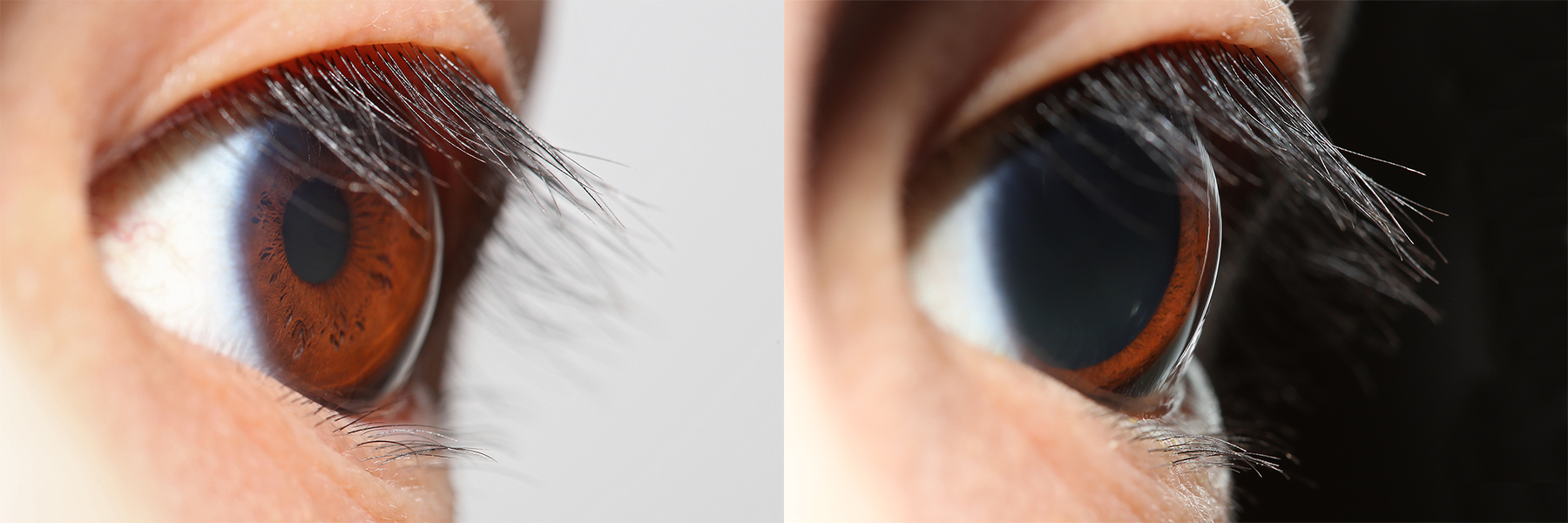|
Darkness
Darkness is the condition resulting from a lack of illumination, or an absence of visible light. Human vision is unable to distinguish colors in conditions of very low luminance because the hue-sensitive photoreceptor cells on the retina are inactive when light levels are insufficient, in the range of visual perception referred to as scotopic vision. The emotional response to darkness has generated metaphorical usages of the term in many cultures, often used to describe an unhappy or foreboding feeling. "Darkness" may also refer to night, which occurs when the Sun is more than 18° below the horizon. Scientific Perception The perception of darkness differs from the mere absence of light that sometimes lead to afterimages. In perceiving, the eye is active, and the part of the retina that is unstimulated produces a complementary afterimage. Physics In terms of physics, an object is said to be dark when it absorbs photons, causing it to appear dim compared to other obje ... [...More Info...] [...Related Items...] OR: [Wikipedia] [Google] [Baidu] |
Night
Night, or nighttime, is the period of darkness when the Sun is below the horizon. Sunlight illuminates one side of the Earth, leaving the other in darkness. The opposite of nighttime is daytime. Earth's rotation causes the appearance of sunrise and sunset. Moonlight, airglow, starlight, and light pollution dimly illuminate night. The duration of day, night, and twilight varies depending on the time of year and the latitude. Night on other celestial bodies is affected by their rotation and orbital periods. The planets Mercury and Venus have much longer nights than Earth. On Venus, night lasts about 58 Earth days. The Moon's rotation is tidally locked, rotating so that one of the sides of the Moon always faces Earth. Nightfall across portions of the near side of the Moon results in lunar phases visible from Earth. Organisms respond to the changes brought by nightfall: darkness, increased humidity, and lower temperatures. Their responses include direct reactions a ... [...More Info...] [...Related Items...] OR: [Wikipedia] [Google] [Baidu] |
Sky Brightness
Sky brightness refers to the visual perception of the sky and how it scatters and diffuses light. The fact that the sky is not completely dark at night is easily visible. If light sources (e.g. the Moon and light pollution) were removed from the night sky, only direct starlight would be visible. The sky's brightness varies greatly over the day, and the primary cause differs as well. During daytime, when the Sun is above the horizon, the direct scattering of sunlight is the overwhelmingly dominant source of light. During twilight (the duration after sunset or before sunrise until or since, respectively, the full darkness of night), the situation is more complicated, and a further differentiation is required. Twilight (both dusk and dawn) is divided into three 6° segments that mark the Sun's position below the horizon. At civil twilight, the center of the Sun's disk appears to be between 1/4° and 6° below the horizon. At nautical twilight, the Sun's altitude is betwee ... [...More Info...] [...Related Items...] OR: [Wikipedia] [Google] [Baidu] |
Composition (visual Arts)
The term composition means "putting together". It can be thought of as the organization of art. Composition can apply to any work of art, from music through writing and into photography, that is arranged using conscious thought. In the visual arts, composition is often used interchangeably with various terms such as ''design, form, visual ordering,'' or ''formal structure,'' depending on the context. In graphic design for press and desktop publishing, composition is commonly referred to as page layout. The composition of a picture is different from its subject (what is depicted), whether a moment from a story, a person or a place. Many subjects, for example Saint George and the Dragon, are often portrayed in art, but using a great range of compositions even though the two figures are typically the only ones shown. Elements of design The central visual element, known as ''element of design'', ''formal element'', or ''element of art,'' constitute the vocabulary with which the vi ... [...More Info...] [...Related Items...] OR: [Wikipedia] [Google] [Baidu] |
Bortle Dark-Sky Scale
The Bortle dark-sky scale (usually referred to as simply the Bortle scale) is a nine-level numeric scale that measures the night sky's sky brightness, brightness of a particular location. It quantifies the astronomy, astronomical observability of celestial objects and the interference caused by light pollution. Amateur astronomer John E. Bortle created the scale and published it in the February 2001 edition of ''Sky & Telescope'' magazine to help skywatchers evaluate the darkness of an observing site, and secondarily, to compare the darkness of observing sites. The scale ranges from Class 1, the darkest skies available on Earth, through to Class 9, inner-city skies. It gives several criteria for each level beyond naked-eye limiting magnitude (NELM). The accuracy and utility of the scale have been questioned in 2014 research. The table summarizes Bortle's descriptions of the classes. For some classes, there can be drastic differences from one class to the next, e.g, Bortle 4 to 5, ... [...More Info...] [...Related Items...] OR: [Wikipedia] [Google] [Baidu] |
Pupil
The pupil is a hole located in the center of the iris of the eye that allows light to strike the retina.Cassin, B. and Solomon, S. (1990) ''Dictionary of Eye Terminology''. Gainesville, Florida: Triad Publishing Company. It appears black because light rays entering the pupil are either absorbed by the tissues inside the eye directly, or absorbed after diffuse reflections within the eye that mostly miss exiting the narrow pupil. The size of the pupil is controlled by the iris, and varies depending on many factors, the most significant being the amount of light in the environment. The term "pupil" was coined by Gerard of Cremona. In humans, the pupil is circular, but its shape varies between species; some cats, reptiles, and foxes have vertical slit pupils, goats and sheep have horizontally oriented pupils, and some catfish have annular types. In optical terms, the anatomical pupil is the eye's aperture and the iris is the aperture stop. The image of the pupil as seen from o ... [...More Info...] [...Related Items...] OR: [Wikipedia] [Google] [Baidu] |
Lighting
Lighting or illumination is the deliberate use of light to achieve practical or aesthetic effects. Lighting includes the use of both artificial light sources like lamps and light fixtures, as well as natural illumination by capturing daylight. Daylighting (architecture), Daylighting (using windows, skylights, or Architectural light shelf, light shelves) is sometimes used as the main source of light during daytime in buildings. This can save energy in place of using artificial lighting, which represents a major component of energy consumption in buildings. Proper lighting can enhance task performance, improve the appearance of an area, or have positive psychological effects on occupants. Indoor lighting is usually accomplished using light fixtures, and is a key part of interior design. Lighting can also be an intrinsic component of landscaping, landscape projects. History With the Control of fire by early humans, discovery of fire, the earliest form of artificial lighting used ... [...More Info...] [...Related Items...] OR: [Wikipedia] [Google] [Baidu] |
Night Vision
Night vision is the ability to see in low-light conditions, either naturally with scotopic vision or through a night-vision device. Night vision requires both sufficient spectral range and sufficient intensity range. Humans have poor night vision compared to many animals such as cats, dogs, foxes and rabbits, in part because the human eye lacks a tapetum lucidum, tissue behind the retina that reflects light back through the retina thus increasing the light available to the photoreceptors. Types of ranges Spectral range Night-useful spectral range techniques can sense radiation that is invisible to a human observer. Human vision is confined to a small portion of the electromagnetic spectrum called visible light. Enhanced spectral range allows the viewer to take advantage of non-visible sources of electromagnetic radiation (such as near-infrared or ultraviolet radiation). Some animals such as the mantis shrimp and trout can see using much more of the infrared and/or ... [...More Info...] [...Related Items...] OR: [Wikipedia] [Google] [Baidu] |
Retina
The retina (; or retinas) is the innermost, photosensitivity, light-sensitive layer of tissue (biology), tissue of the eye of most vertebrates and some Mollusca, molluscs. The optics of the eye create a focus (optics), focused two-dimensional image of the visual world on the retina, which then processes that image within the retina and sends nerve impulses along the optic nerve to the visual cortex to create visual perception. The retina serves a function which is in many ways analogous to that of the photographic film, film or image sensor in a camera. The neural retina consists of several layers of neurons interconnected by Chemical synapse, synapses and is supported by an outer layer of pigmented epithelial cells. The primary light-sensing cells in the retina are the photoreceptor cells, which are of two types: rod cell, rods and cone cell, cones. Rods function mainly in dim light and provide monochromatic vision. Cones function in well-lit conditions and are responsible fo ... [...More Info...] [...Related Items...] OR: [Wikipedia] [Google] [Baidu] |
Scotopic Vision
In the study of visual perception, scotopic vision (or scotopia) is the vision of the eye under low-light conditions. The term comes from the Greek ''skotos'', meaning 'darkness', and ''-opia'', meaning 'a condition of sight'. In the human eye, cone cells are nonfunctional in low visible light. Scotopic vision is produced exclusively through rod cells, which are most sensitive to wavelengths of around 498 nm (blue-green) and are insensitive to wavelengths longer than about 640 nm. Under scotopic conditions, light incident on the retina is not encoded in terms of the spectral power distribution. Higher visual perception occurs under scotopic vision as it does under photopic vision. Retinal circuitry Of the two types of photoreceptor cells in the retina, rods dominate scotopic vision. This dominance is due to the increased sensitivity of the photopigment molecule expressed in rods, as opposed to those in cones. Rods signal light increments to rod bipolar cells which, ... [...More Info...] [...Related Items...] OR: [Wikipedia] [Google] [Baidu] |
Guinness World Records
''Guinness World Records'', known from its inception in 1955 until 1999 as ''The Guinness Book of Records'' and in previous United States editions as ''The Guinness Book of World Records'', is a British reference book published annually, listing world records both of human achievements and the extremes of the natural world. Sir Hugh Beaver created the concept, and twin brothers Norris and Ross McWhirter co-founded the book in London in August 1955. The first edition topped the bestseller list in the United Kingdom by Christmas 1955. The following year the book was launched internationally, and as of the 2025 edition, it is now in its 70th year of publication, published in 100 countries and 40 languages, and maintains over 53,000 records in its database. The international franchise has extended beyond print to include television series and museums. The popularity of the franchise has resulted in ''Guinness World Records'' becoming the primary international source for cata ... [...More Info...] [...Related Items...] OR: [Wikipedia] [Google] [Baidu] |
NBC News
NBC News is the news division of the American broadcast television network NBC. The division operates under NBCUniversal Media Group, a division of NBCUniversal, which is itself a subsidiary of Comcast. The news division's various operations report to the president of NBC News, Rebecca Blumenstein. The NBCUniversal News Group also comprises MSNBC, the network's 24-hour liberal cable news channel, as well as business and consumer news channels CNBC and CNBC World, the Spanish language and United Kingdom-based Sky News. NBC News aired the first regularly scheduled news program in American broadcast television history on February 21, 1940. The group's broadcasts are produced and aired from 30 Rockefeller Plaza, NBCUl's headquarters in New York City. The division presides over the flagship evening newscast ''NBC Nightly News'', the world's first of its genre morning television program, ''Today (American TV program), Today'', and the longest-running television series in American hi ... [...More Info...] [...Related Items...] OR: [Wikipedia] [Google] [Baidu] |
Creation Of Light
Creation or The Creation or Creations, may refer to: Arts and entertainment Film * ''Creation'' (1922 film), a British silent drama * ''Creation'' (unfinished film), 1931 * ''Creation'' (2009 film), about Charles Darwin Literature * ''Creation'' (novel), by Gore Vidal, 1981 *''The Creation'', a 2006 book by E. O. Wilson *"The Creation", a 1927 poem by James Weldon Johnson in '' God's Trombones'' Music * Creation Records, a record label created in 1983 * ''The Creation'' (Haydn), a 1798 oratorio by Joseph Haydn *''Creation'', a movement by Nathaniel Shilkret in the '' Genesis Suite'', 1945 Bands * Creation (American band), a teen musical group * Creation (Japanese band), formed as Blues Creation * Creations (band), Australian Christian band * The Creation (band), an English rock band Albums * ''Creation'' (John Coltrane album), 1965 * ''Creation'' (Branford Marsalis album), 2001 * ''Creation'' (Keith Jarrett album), 2015 * ''Creation'' (Archie Roach album), 2013 * ''Creation' ... [...More Info...] [...Related Items...] OR: [Wikipedia] [Google] [Baidu] |







